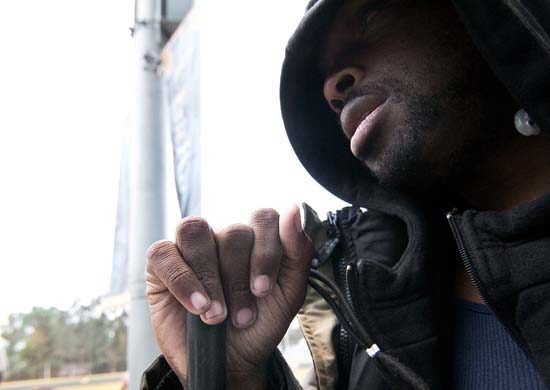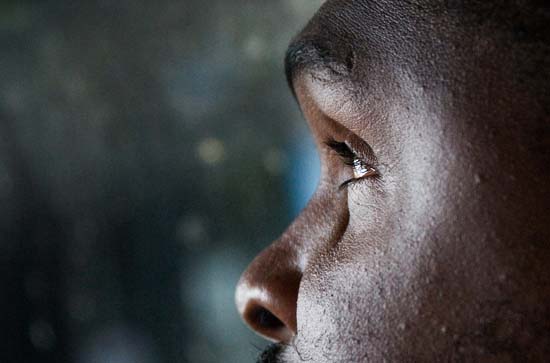


I forgot to ask him this, but I wonder if Eric Calhoun knows what a baseball looks like.
When he feels the smooth, slippery leather or hears it pop against his hand, what does he visualize in his head?
I wonder if he knows that those little notches on either side of the ball are red.
Calhoun is UCLA’s biggest baseball fan. USC’s too. He’s been coming to Jackie Robinson Stadium every spring since 1997 ““ but it’s never been easy for him.
To go to a UCLA baseball game, Calhoun has to walk with his thin metal folding stick to the bus stop, take the bus to Westwood, negotiate another ride from the bus stop to Jackie Robinson Stadium, make his way down an awkward grass hill, up three flights of stairs, and then back down the bleachers to an open seat. Then he does the whole thing over again after 11 p.m. to go home to Crenshaw.
If the team goes south to San Diego, Calhoun heads south too. A two-hour ride on the Greyhound, then a few minutes on the trolley, and he’s there in no time.
But these synopses of his game-day routines fail to mention impatient bus drivers who yell at him, arrogant pedestrians who think he needs help when he’s really doing just fine, and the fact that the bus and baseball game cost money ““ money the unemployed and unemployable Calhoun does not have.
But don’t offer him a ride home if you plan on leaving early. Calhoun will never sacrifice a few pitches for the sake of beating traffic. He once stayed at a Cal State Fullerton game until it ended at 1:30 a.m. He didn’t get home until after 3 a.m.
Calhoun loves baseball so much that he attends minor league and inexpensive pro ball when college baseball isn’t in season.
And yet he can’t see any of it. This 36-year-old man has been blind since the day he was born.
So how is it possible for him to love something without any ocular proof that it exists?
It took eight hours of driving, eating and watching a UCLA versus USC baseball game with Calhoun to start to understand what motivates him to come to Westwood over and over again.
If anything became clear by the end of the night, it was this: Even though he’s never felt the satisfaction of bat hitting ball, Calhoun loves the game of baseball and wants to get as close to it as he can, whenever he can.
5:17 p.m.
Calhoun and I talk baseball on the ride to the game in Westwood, and one would assume he was the sports writer from San Diego, not me. He lectures me about how the Padres’ triple-A farm team in Portland, Ore., might be planning to move to somewhere in Arizona, and he tells me to read Voice of San Diego ““ an online newspaper in my hometown that I didn’t know existed.
My skepticism eventually prevails, and I ask him how he knows whom to trust when asking for a ride after he gets off the bus in San Diego.
“I always ask questions,” he says.
“Don’t you have someone who can come with you?” I wonder aloud.
“No, I come on my own.”
6:22 p.m.
I hold my breath as Calhoun holds my arm, and we make our way up the stairs. It’s a packed house. Before I can stop him, Calhoun yells, “Where the Trojans at?” which raises a small cheer as we are indeed in the USC fan area. He veers away from the security of my arm for a moment, feels a rail and proclaims, “I know where I’m at.” Then he hops down each stair one at a time.
A man in the top row looks at Calhoun and me and urges me to “tell him there’s no seats here.” This man presumably wants Calhoun to avoid the embarrassment of unknowingly sitting on someone’s lap.
“Come on man,” he says, his eyes stern. “Tell him.”
My eyes search for Calhoun, and there he is, already in an aisle seat that someone must have moved out of to make room for him.
6:41 p.m.
“Strike inside corner ““ infielders shifting right.”
Alfred Oropesa, the father of a USC slugger, is accustomed to giving Calhoun his best play-by-play while sitting a row behind him.
So everyone at USC knows Calhoun too?
“He’s the No. 1 fan,” Oropesa says authoritatively. “If I had a choice, I’d put a jersey on him and put him in the dugout to pump (USC) up.”
“Come on, Beanie,” Calhoun yells at that moment, proving Oropesa’s point. “You’re laboring, you’re laboring!”
Then a few pitches later: “Come on! Quit love tappin’ the ball! Love tap your girlfriend!”
“He can’t see,” Oropesa says. “But at the same time he knows.”
8:30 p.m.
It’s the bottom of the fifth and time for food. The $6 cash I have won’t be enough for everything Calhoun wants: a cheeseburger, peanuts and a Sprite.
But as I walk up the stairs to report the bad news, a woman is holding out a $5 bill.
I utter a thank you, pay for the food and then return to thank the kind donor, Canace Smith, another baseball parent.
“He can’t work,” she says. “We know the reality of his situation. If he’s going to come out here, we’re going to take care of him.”
Smith explains to me that at USC, Calhoun often doesn’t show up until after the seventh inning ““ the point after which admission is free. She finds this to be an injustice considering Calhoun “has to do stuff we don’t even think about to get to games.”
“He really should be able to get in free,” Smith says. “Of all things, we should be petitioning to get Calhoun a season pass.”
8:48 p.m.
When I return to my seat, the enthusiastic Calhoun is subdued, eating. For the next 15 minutes he barely says a word, focusing on the art of breaking peanut shells and then pushing the peanut up toward his mouth so as not to lose the precious nut inside.
There’s Calhoun ““ a grown man who lives with his mother, curled up in two thick black jackets with raggedy old sweatpants and dusty black shoes ““ struggling to eat. His eyes, shadowed by his hood, are open but strangely in the corner of his sockets. At this particular moment, Calhoun looks intimidating and secluded.
11:11 p.m.
I discover more things about Calhoun on the drive home: He’s an alumnus of North Torrance High School ““ a place he revisits for football games. He first became a fan of baseball by following a friend of a friend who played pro ball and hasn’t stopped loving the game since ““ he even tried to throw the ball around in high school.
“I liked it,” he says. “But I didn’t stay with it.”
Those words were the first I really heard all night. I think they struck me because they underscore a critical point about the nature of sports.
It doesn’t take much to make a young sports fan stop playing the game he loves. If, like me, you have a minor disability or a hand-eye coordination problem, your athletic career is really over by age 8.
But unlike the rest of us who at least get the chance to try, Calhoun never really did.
Even the last person picked for the team got a game-winning hit once. And even the benchwarmers like me got to be part of a team ““ a group of guys who would be there to lift you into the air that one time in a million that you got that hit.
Calhoun never got to experience any of that.
“(But) I never bad-mouthed my own blindness,” Calhoun says as if on cue. “I was always on the patient side. I find that sometimes people say they hate being blind. I don’t like that. That tells me they’re not paying attention to what they have.”
11:48 p.m.
We pull up to the Calhoun house, walk through a chipped white wooden door and enter a front room that is essentially a standing room only thanks to an infinite amount of clutter. Calhoun disappears into a back room and emerges with his mother Lorine Calhoun, who he woke from her slumber so she could talk to us.
After he steps out to go visit a neighbor, I stay to talk with Lorine Calhoun about her son’s past.
Lorine Calhoun once went to the trouble of filing a class action suit on her son’s behalf to try to get Supplemental Security Income in the Virgin Islands where they lived. She wanted the challenge to make it to the Supreme Court.
“But it never got through,” she admits.
I tentatively ask her what the hardest part about raising a visually impaired child was, and she responds before I finish the question.
“Finding out he was blind,” she says, her voice starting to tremble. “Each nurse that gave him to me said he had been humming. So I said, “˜Give me Stevie Wonder or Ray Charles.'”
Calhoun’s mother knew her son was blind from the moment she saw him. Babies only hum, she rationalizes, if they have to keep themselves company. And normal babies would smile and laugh ““ but not her son.
“He had a slight smile, because he could see a little bit when he was born, and that went away,” Calhoun’s mother says.
“That’s why, after birth, he has never really laughed, never really smiled whole-heartedly.”
“But he sure seems to love baseball,” I offer with encouragement.
“Because he was blind, he went to school all his life,” Lorine Calhoun says. “We’re talking elementary school all the way through and every summer school. He didn’t have a chance to enjoy sports … he couldn’t even go to the games or anything because he had so much work to make up. He was deprived and robbed of sports in high school.”
I remember that last line punching me in the gut especially hard.
That was the late moment at which I began to truly understand at least one facet of Calhoun’s love for baseball. At some fundamental level, he and I were both kids with disabilities that robbed us of our love. And here we both were, Calhoun satiating his passion by going to college baseball games with the help of his friends, and me doing exactly the same, getting close to sports through my ability to write about them.
But that wasn’t the only reason Calhoun loves baseball. Baseball gives Calhoun camaraderie, a second family, a comfortable home. Just as a third baseman feels most comfortable on the infield dirt, six feet off the bag, Calhoun loves sitting in his aisle seat a foot away from the handrail.
At Jackie Robinson Stadium, no bus driver yells at him; no arrogant pedestrian angrily pushes him across the street. Here they cheer for him and with him. Here he never goes hungry. Here his life is fulfilling.
That’s why he never complains about being blind. He lives out his own mantra and realizes what he has. For all the effort Calhoun gives to baseball, baseball pays him back every time.
So it really doesn’t matter if Calhoun knows what a baseball looks like.
He loves the game just the same.
E-mail Stevens at mstevens@media.ucla.edu.
